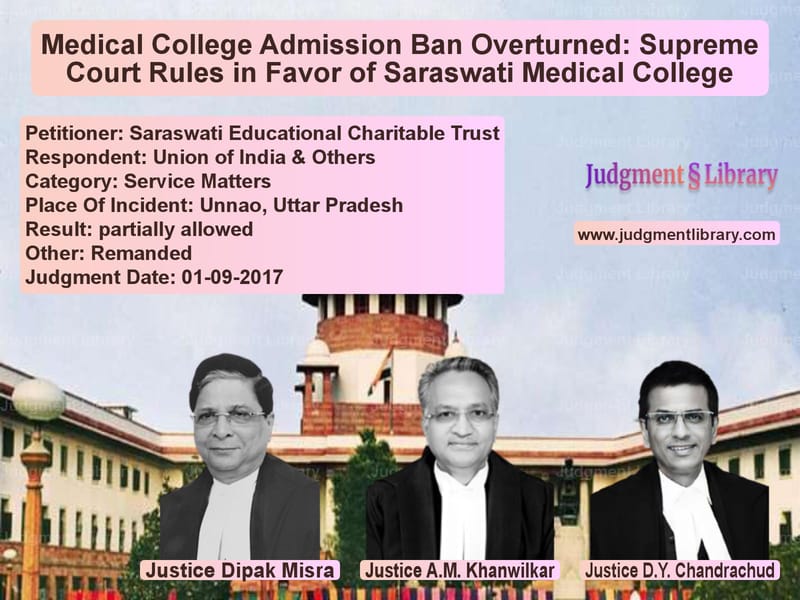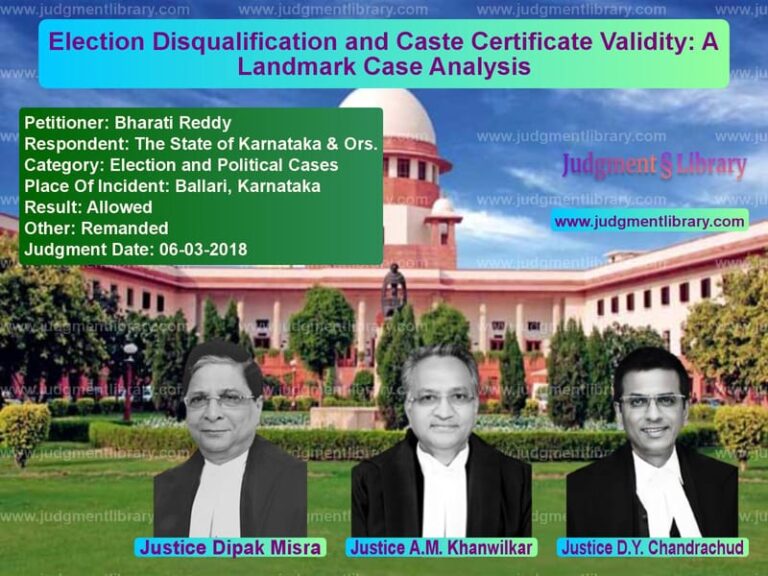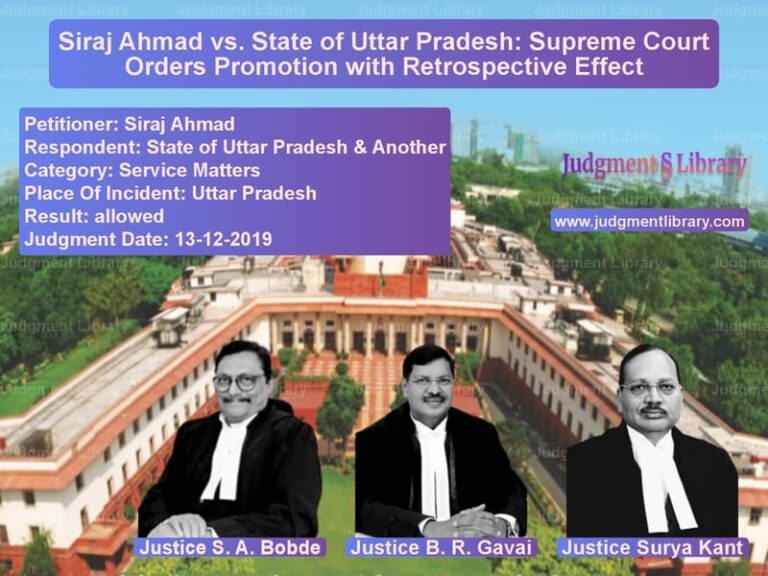Medical College Admission Ban Overturned: Supreme Court Rules in Favor of Saraswati Medical College
The case of Saraswati Educational Charitable Trust vs. Union of India & Others revolves around the Medical Council of India’s (MCI) refusal to grant renewal permission for MBBS admissions at Saraswati Medical College, Unnao. The Supreme Court was called upon to determine whether the MCI’s decision to debar the college for two academic years (2017-18 and 2018-19) and encash its bank guarantee was legally justified.
Background of the Case
The petitioner, Saraswati Educational Charitable Trust, applied for the establishment of Saraswati Medical College in Unnao, Uttar Pradesh, for the academic session 2016-17. The Ministry of Health & Family Welfare forwarded the application to the MCI for evaluation. While conditional permission was granted for 2016-17, subsequent inspections in November and December 2016 led to the rejection of renewal for 2017-18 and 2018-19, citing deficiencies.
On May 31, 2017, the Ministry debarred the college from admitting students for two years and authorized the encashment of the Rs. 2 crore bank guarantee. The college challenged this decision before the Supreme Court.
Arguments of the Petitioner
The college put forth the following arguments:
- The deficiencies cited in the MCI reports were either minor or had been rectified.
- The debarment for two years and the encashment of the bank guarantee were excessive and arbitrary.
- The second inspection conducted in December 2016 was unnecessary as the first inspection in November 2016 had already assessed compliance.
- The Oversight Committee (OC) appointed by the Supreme Court had confirmed the college’s compliance.
- The MCI and Ministry failed to provide a reasoned order, ignoring critical recommendations from the Oversight Committee.
Arguments of the Respondents
The Union of India and MCI countered the claims, arguing:
- The deficiencies noted in the assessment reports were substantial and affected the quality of medical education.
- The college had failed to comply with the conditions imposed during the previous renewal.
- The second inspection was justified to verify ongoing compliance.
- The Ministry had the authority to debar non-compliant institutions to uphold medical education standards.
Key Observations by the Court
The Supreme Court analyzed the regulatory framework governing medical colleges and assessed the fairness of the MCI’s actions. It noted:
- The Oversight Committee’s findings had been disregarded without sufficient justification.
- The debarment order did not provide adequate reasoning for rejecting the college’s compliance submissions.
- Minor faculty and resident deficiencies of 1.5% and 6.52%, respectively, could not justify a two-year ban.
- The second inspection lacked transparency and was conducted without clear justification.
Important Extract from the Judgment:
“The power to regulate medical education must be exercised fairly and transparently. Debarring a medical institution from admitting students must be a measure of last resort, supported by substantial evidence of non-compliance.”
Final Judgment
The Supreme Court ruled in favor of the petitioner, issuing the following directions:
- The order debarring the college for two years was quashed.
- The Ministry was directed to conduct a fresh assessment within two months.
- The encashment of the bank guarantee was stayed until a final decision was reached.
- The college was allowed to participate in the ongoing counseling process for MBBS admissions for 2017-18.
Implications of the Judgment
This ruling has significant implications for medical education regulation:
- It reinforces the importance of due process and reasoned decision-making in regulatory actions.
- It sets a precedent that medical colleges must be given fair opportunities to rectify deficiencies before facing punitive measures.
- It underscores the role of judicial oversight in preventing arbitrary actions by regulatory authorities.
- It ensures that future medical college inspections are conducted with transparency and accountability.
Conclusion
The Supreme Court’s decision in this case serves as a crucial precedent in medical education regulation. It upholds the principles of fairness and transparency while ensuring that medical colleges meet essential standards. The ruling provides a balanced approach, safeguarding both the interests of students and the integrity of the regulatory framework governing medical education in India.
Don’t miss out on the full details! Download the complete judgment in PDF format below and gain valuable insights instantly!
Download Judgment: Saraswati Educationa vs Union of India & Oth Supreme Court of India Judgment Dated 01-09-2017.pdf
Direct Downlaod Judgment: Direct downlaod this Judgment
See all petitions in Recruitment Policies
See all petitions in Public Sector Employees
See all petitions in Employment Disputes
See all petitions in Judgment by Dipak Misra
See all petitions in Judgment by A M Khanwilkar
See all petitions in Judgment by Dhananjaya Y Chandrachud
See all petitions in partially allowed
See all petitions in Remanded
See all petitions in supreme court of India judgments September 2017
See all petitions in 2017 judgments
See all posts in Service Matters Category
See all allowed petitions in Service Matters Category
See all Dismissed petitions in Service Matters Category
See all partially allowed petitions in Service Matters Category







